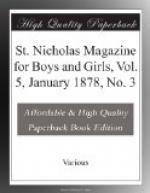R.V.D.
CATCHING BIRDS ON THE WING.
As if a man could ever hope to do that, or even to do so much as fly! And yet, word has already come to me of a man who has made a machine with which he actually has flown, up, down, with the wind, against the wind, and, in fact, any way he wished!
The particular machine he used looked, I’m told, rather like a big bolster-case blown full of air, and with a light frame-work of hollow brass tubes strapped to it underneath. In this frame-work was a seat for the man, and near him were two circular fans, which he turned round very fast indeed; one of the fans made the machine fly backward or forward, and the other made it go up or down, as he liked.
Now, this certainly seems to be a step ahead, or, rather, a flap upward; but you needn’t expect to be chasing and catching eagles and albatrosses on the wing by dropping salt on their tails; at least, not just yet, my dears. The time for that sort of fun may come, perhaps; but it would be well not to crow too loudly at present.
THE BEE AND THE ANEMONE.
Des Moines, Iowa.
DEAR JACK-IN-THE-PULPIT: The bee you told us of in your August sermon did not mistake the anemone for a flower. At least, I think not. No bee ever makes such a mistake as to settle on a poisonous flower, and I believe that this bee went to the anemone for water and not for honey. Bees will settle on pieces of straw afloat in the water, when seeking for water, and I believe they know, even while on the wing, where to find honey. Good-bye.—Your friend. N.E.H.
FRANGIPANI SCENT AND PUDDINGS.
“Let’s begin with the puddings, and make sure of them,” as a little boy once remarked. Well, then, in former times, Frangipani puddings were of broken bread, and their queer name is made from two words,—frangi, meaning “to break,” and panus, “bread”; but, after some time, these puddings were made with pastry-crust and contained cream and almonds.
Frangipani scent, however, was named after a great marquis who first made it, getting it from the jasmine plant. And the marquis got his name from an ancestor whose duty it had been to break the holy bread or wafer in one of the church services, and who on that account was called “Frangipani,” or “Breaker of Bread.”
Now, this way of explaining how words come to be formed, sounds well enough, no doubt. But how are we to know, in this case, that the marquis didn’t invent the pudding as well as the scent? However, I must leave you to puzzle out the problem for yourselves, my dears, while I give you some information about




